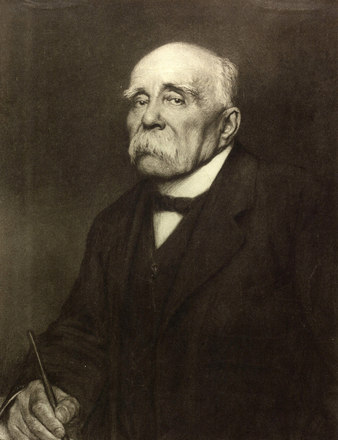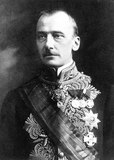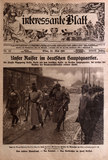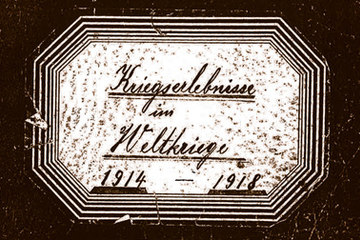In parallel with the war on the battlefields another war was being waged on the diplomatic level, in which Vienna’s confused policy between war and peace ended in a humiliation and led the Habsburg Monarchy into a diplomatic catastrophe.
After years of war, when the general exhaustion was making victory for the Central Powers ever more improbable, the opposing states engaged in a number of rounds of exploratory peace talks. In one case from the early months of 1917, Emperor Karl had secretly made contact with France in letters delivered by his brother-in-law Prince Sixtus of Bourbon-Parma – the ‘Sixtus Letters’ – in order to sound out the Allies’ readiness to conclude a peace treaty. Karl’s initiative, however, had soon proved a failure.
On 2 April 1918 the Austrian Foreign Minister Czernin delivered a pronouncedly aggressive speech before Vienna City Council that was intended to strengthen fighting spirit and boost loyalty to Austria’s ally in Berlin. In order to emphasize the weakness of the Western Powers, he also mentioned that France had made contact with Austria in connection with a separate peace.
The French Minister-President Georges Clemenceau reacted to this verbal attack by the Austrian foreign minister with a cleverly orchestrated campaign in the media, using certain letters from Emperor Karl’s secret correspondence with Paris to compromise the Austrian Emperor and drive a wedge into the alliance between Germany and the Danube Monarchy. Clemenceau informed the press about Karl’s abortive peace initiative of 1917 and even went so far as to publish one of the clandestine letters.
The story exploded like a bombshell in the Austrian and German news. Czernin very imprudently denied that he had known about the peace initiative – which was definitely untrue, though he may not have been fully informed about it – and refused to cover up for the Emperor.
Karl was thus publicly exposed and found himself forced into a tight corner. If he frankly admitted his involvement in the matter, he would be denounced as a traitor by his German allies and by the pro-German camp at home; and if he denied it, he would be jettisoning his relationship of confidence with the Western Powers.
Karl chosen the second path. He had it announced that the whole affair had been a product of French propaganda and wrote to Kaiser Wilhelm to confirm his loyalty to the alliance: ‘Monsieur Clemenceau’s accusations against me are so base that I am not of a mind to discuss the matter with France any further. Henceforth our answer shall be our cannons in the west.’ On 12 May 1918 he made a humiliating visit to Kaiser Wilhelm at the German headquarters in Spa, which was described in the press as an act of penance comparable to Emperor Henry IV’s proverbial ‘walk to Canossa’.
The Sixtus Affair was a diplomatic débacle of the first order for Austria and deprived the Habsburg Monarchy of the little freedom of movement in foreign affairs it still possessed. Emperor Karl now had no option but to fall in step with Germany’s intensified war effort. At home he had been completely compromised and had lost his credibility. His consort Zita was fiercely attacked in the public sphere and reviled as a traitor on account of her Franco-Italian origins. It was claimed that she had been the one pulling the strings in the background, and Karl was caricatured as a hen-pecked ‘armchair hero’ sitting firmly under his wife’s thumb.
Translation: Peter John Nicholson
Bihl, Wolfdieter: Der Erste Weltkrieg 1914–1918. Chronik – Daten – Fakten, Wien/Köln/Weimar 2010
Griesser-Pečar, Tamara: Die Mission Sixtus, Wien 1988
Hirschfeld, Gerhard/Krumeich, Gerd/Renz, Irina (Hrsg.): Enzyklopädie Erster Weltkrieg. Aktualisierte und erweiterte Studienausgabe, Paderborn/Wien [u.a.] 2009
Kann, Robert A.: Die Sixtusaffäre und die geheimen Friedensverhandlungen Österreich-Ungarns im Ersten Weltkrieg, Wien 1966
Rauchensteiner, Manfried: Der Erste Weltkrieg und das Ende der Habsburgermonarchie 1914–1918, Wien u. a. 2013
-
Chapters
- The course of the war 1917–1918: Face-to-face with imminent downfall
- The situation in the hinterland
- Apathy and resistance – The mood of the people
- The Sixtus Affair: A major diplomatic débacle
- A programme for world peace – President Wilson’s Fourteen Points
- ‘To My faithful Austrian peoples’ – Emperor Karl’s manifesto
- The collapse
- The disintegration of the Habsburg Monarchy – Part I: On the road to self-determination
- The disintegration of the Habsburg Monarchy – Part II: The situation in Vienna and Budapest
- The last days of the Monarchy










